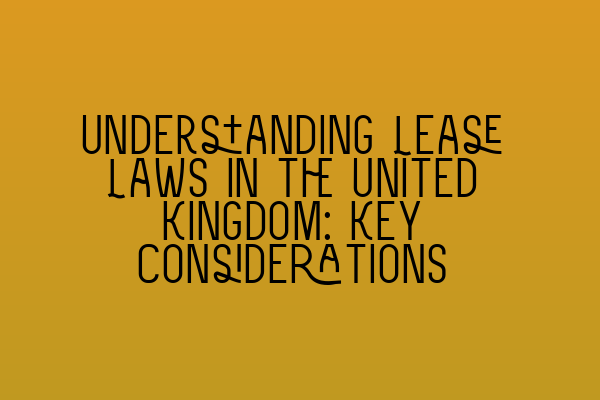Understanding Lease Laws in the United Kingdom: Key Considerations
Lease laws play a crucial role in the United Kingdom’s property market. Whether you are a landlord, tenant, or property investor, having a solid understanding of lease laws is essential to protect your rights and interests. In this blog post, we will delve into the key considerations of lease laws in the UK, helping you navigate the complexities of leasing agreements with confidence.
1. The Basics of Lease Laws
Leases are contractual agreements between landlords and tenants that grant rights and responsibilities to both parties. These agreements outline the terms and conditions of occupying a property, such as rent, duration, repairs, and restrictions. It is crucial to carefully review and understand these terms before entering into a lease to avoid any potential disputes or misunderstandings.
2. Types of Leases
There are various types of leases recognized under UK lease laws. The most common types include:
a. Full Repairing and Insuring (FRI) Lease: This type of lease places the responsibility for maintaining and repairing the property on the tenant. The tenant is also responsible for paying insurance premiums.
b. Assured Shorthold Tenancy (AST) Lease: This is the most common type of residential lease in the UK. AST leases typically run for a fixed term of six or twelve months and provide certain statutory rights and protections for tenants.
c. Commercial Leases: Commercial leases are tailored to the needs of businesses and can vary significantly in terms of length and conditions. It is essential to thoroughly review and negotiate the terms of a commercial lease to protect your business’s interests.
3. Tenant Rights and Obligations
Under UK lease laws, tenants have specific rights and obligations they must adhere to. These include:
a. Paying Rent: Tenants are obligated to pay rent on time as outlined in the lease agreement. Failure to do so may result in legal action or eviction.
b. Maintenance and Repairs: Depending on the type of lease, tenants may be responsible for maintaining and repairing the property. However, landlords have an obligation to ensure the property is safe and habitable.
c. Quiet Enjoyment: Tenants have the right to peaceful enjoyment of the property without unnecessary interference from the landlord.
4. Landlord Rights and Obligations
Landlords also have rights and obligations they must uphold, including:
a. Collecting Rent: Landlords have the right to collect rent as agreed upon in the lease agreement. However, they must follow proper legal procedures if the tenant fails to pay rent.
b. Property Maintenance: Landlords are responsible for ensuring that the property meets certain health and safety standards. They must address any necessary repairs and keep the property in a habitable condition.
c. Notifying Tenants: Landlords must provide sufficient notice to tenants for any visits, inspections or repairs to the property.
5. Lease Termination
The termination of a lease is a critical aspect of lease laws in the United Kingdom. Both tenants and landlords may have specific termination rights, which can vary depending on the type of lease and its terms. It is vital to understand these rights and follow the proper procedures to avoid legal complications.
In summary, a deep understanding of lease laws in the United Kingdom is essential for all parties involved in the leasing process. Whether you are a tenant, landlord, or property investor, having a comprehensive knowledge of lease laws will help protect your rights, ensure compliance with regulations, and avoid potential legal issues.
If you’re studying for the SQE exams or looking for preparation resources, be sure to check out our related articles:
– SQE 1 Practice Exam Questions
– SQE 1 Practice Mocks FLK1 FLK2
– SQE 2 Preparation Courses
– SQE 1 Preparation Courses
– SRA SQE Exam Dates
By staying informed and seeking professional advice when needed, you can navigate lease laws with confidence, ensuring a smooth and successful leasing experience.
